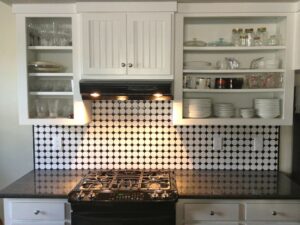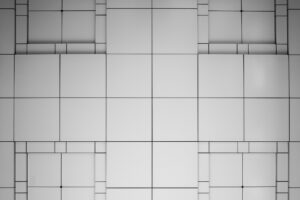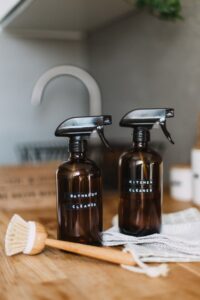If you take a look inside your oven, you’ll probably see some of the most stubborn and nasty gunk. For that reason, oven cleaners are considered the holy grail of the kitchen cleaners world. They offer some of the most powerful formulas to remove these hard stains. You have probably considered using them on countertops as well. If you have, you are probably asking yourself “what is the effect of oven cleaner on kitchen countertops?”.

You might be asking it because you have stubborn grime to deal with or out of curiosity. In this article, you’ll find the ultimate answer to your question. So without further ado, let’s hop in!
What Is the Effect of Oven Cleaner on Kitchen Countertops?
Oven cleaners are extremely powerful solutions that can remove extremely difficult and stubborn grimes. It has a terribly abrasive effect on sealants and will eat away and damage its layers. This will cause a whole slew of problems that can render your kitchen counter unusable.
In addition to sealants, oven cleaners are extremely abrasive. They can damage a wide range of surfaces as well in various ways, including:
- Tarnish the shine of the counter
- Change the colors of the counter
- Damage the internal structure of the counter
For that reason, you should never use oven cleaners on kitchen counters. Instead shift to milder and non-abrasive alternatives. But more on that shortly.
What Makes Oven Cleaners Unsuitable for Kitchen Counters?
To understand why we should avoided it, let’s have a look at the main ingredients and chemicals used in oven cleaners.
Typically, most formulas exclusively designed for oven cleaning will have Sodium Hydroxide, also known as “caustic soda”, as the main ingredient. Sodium hydroxide is an extremely powerful alkali that can crack down and remove the most stubborn and severely sticking burnt on greases.
However, if you hold regular countertop-friendly cleaners, you might find it containing sodium hydroxide in its ingredients. So what’s the difference? The difference is in the concentration used in oven cleaner formulas. They are usually several folds higher than regular household and surface cleaners. In such concentration, these ingredients can break down the sealant layer that keeps your kitchen counter’s durability. They might also reduce its ability to repel water damage.
What Types of Kitchen Counters Surfaces Are Prone to Oven Cleaners’ Damage?
Some kitchen countertops are better than others. In fact, you can make a kitchen counter from just about any material, including wood, marble, stone, granite, stainless steel, and more!
Here’s a brief overview of the materials that are most affected by oven cleaners:
- Wood:
Concentrated sodium hydroxide can easily dissolve the sealant layer that protects the wood from moisture and water damage.
- Stone and Tile

They also have a sealant that prevents water from messing up with their internal structure.. Stone surfaces will absorb the caustic soda and release poisonous fumes into the food. This will also create pores that can attract bacteria and mold.
- Marble:
Smooth marble is also waxed to seal the surface. Therefore, it is a fair game for caustic soda and can get discoloured by it too.
- Stainless steel:
Even stainless steel safe oven cleaner is technically only safe for the inside of an oven. On the outside of the oven, many manufacturers save money by only adding a thin layer of stainless steel over ordinary steel. The oven cleaner can damage this thing layer, ruining the appearance of the appliance.
What Should You Use to Clean Kitchen Counters?
Instead of damaging oven cleaners, you can try using some surface cleaners that have mild effect. The ones below won’t destroy the sealant layer. These cleaners include:
- Diluted Sodium Hydroxide

- Bleach
- Ammonia
- Dish soap
- Kitchen degreasers
- White vinegar
As a general rule, diluted sodium hydroxide cleaners can be used to clean all kinds of surfaces with remarkable results. Just make sure that the formula is intended for that specific surface. Also, that it has a very low concentration of sodium hydroxide bleach and ammonia, as those are also quite aggressive. However, with enough dilution, they can do the job without damaging your surface.
Also, they can be used to remove stubborn grime without worrying about the counter losing its pretty luster.
What Else Can You Clean With Oven Cleaners?
As the name suggests, oven cleaners are specifically and exclusively designed for cleaning the insides of a greased up oven. Yet, you can also use their incredible cleaning power to clean off pyrex cookware as well as some types of pot and pans.
However, you should only use oven cleaners as a last resort when all other means fail to remove the stubborn grime. And even then, you should be extremely careful while using it.
What to Do if You Already Used Oven Cleaner on a Kitchen Counter?
If you already scrubbed oven cleaner on your kitchen counter, you directly exposed your surface to moisture and chemical damage. The first thing to do is to get a suitable sealant for the type of countertop you have and apply a coating layer. You can always contact a professional to assess the damage and do the job for you.
Wrap Up
With that said, you now know what is the effect of oven cleaner on kitchen countertops. As you can see, using oven cleaners on kitchen counters will etch away the sealant that protects the counter from kitchen moisture. You should avoid them at all cost.
Instead, you can use some of the alternatives above. Rest assured, you’re going to love the results!
